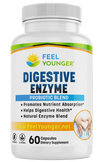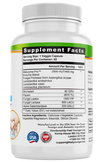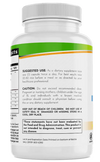Empower your digestion with our Digestive Enzyme supplement that can help alleviate IBS symptoms, ease acid reflux, and combat indigestion.
These capsules can also help produce less gas, bloating, and enhanced nutrient absorption. A must-have for comprehensive digestive wellbeing!
Digestive Enzyme Probiotic Blend
Empower your digestion with our Digestive Enzyme supplement that can help alleviate IBS symptoms, ease acid reflux, and combat indigestion.
These capsules can also help produce less gas, bloating, and enhanced nutrient absorption. A must-have for comprehensive digestive wellbeing!
- Product Description
- Supplement Facts
If you’d like to…
- Alleviate Symptoms of IBS
- Prevent or Reduce Diarrhea and Constipation
- Relieve Acid Reflux, Indigestion & Heartburn
- Lessened Gas & Bloating
- Increase Nutrient Absorption & Facilitate Digestion of Difficult Foods
- Optimize Your Body’s Ability to Break Down Carbohydrates, Proteins and Fats
- Support the Health of Your Colon
- Support The Healthy Bacteria in Your Intestines to Improve Digestive Health
- Restore Your Digestive Tract’s Natural Microbiome After Antibiotics
You may want to give our Digestive Enzyme Probiotic Blend supplement a try!
Our Digestive Enzyme and Probiotic Blend can also potentially give you a whole host of other health benefits, such as:
- Immune System Support
- Improved Heart Health
- Improved Mood & Anxiety
- Reduced Cholesterol
- Improved Weight Loss
- Reduced Pain & Inflammation
Why is it Important to Support Your Gastrointestinal System & Digestion?
Your gastrointestinal tract (gut) is a long tube that stretches from the mouth, all the way to your anus. It is responsible for 2 extremely important processes in our body. The first process is digestion.
No matter how healthy (or not) your diet may be, optimal gut health is important for digestion so that you can absorb nutrients from food efficiently, utilize the building blocks that you need to maintain your body, and efficiently convert the food you eat into energy.
Digestive enzymes are proteins that your body makes (mainly in your pancreas, but also in your small intestine, stomach and mouth) to break down food so your body can absorb the nutrients.
For example, the digestive enzyme lipase is made to break down fats into glycerol and smaller fatty acids. The digestive enzyme lactase is made to help break down the natural sugar contained within milk which is called lactose.
The second extremely important process that your digestive tract is significantly responsible for is your immune system. In fact, around 70% of your immune system is in your gut, which means good gut health is essential for optimal immune function to fight off bacteria, viruses and other pathogens that are dangerous to our bodies and can make us unwell.
A healthy gut should contain many billions of “good” bacteria which multiply rapidly and create an acidic environment in the intestines so that the “bad” bacteria isn’t able to proliferate. The balance of these bacteria is often referred to as the gut microbiome (referring to microbes that are present in your digestive system).
When your gut is not in good health, it will struggle to get rid of toxins (like endotoxin, believed to be a key factor in premature aging [1]) and substances that are left over from metabolic processes (metabolic waste) that must be excreted because they cannot be used by our bodies.
What Impacts the Health of Your Gut & Digestion?
If there is a problem with your digestive tract then digestive symptoms such as diarrhea, constipation, bloating, excess gas, abdominal pain, acid reflux and more can develop. But poor gut health can cause inflammation throughout the body, leading to a myriad of different health issues.
In fact, ancient traditional modalities of health and healing, like Ayurvedic Medicine, actually believed that ‘all’ ill health had its origins in the gut.
The gut is also known as an “extension of the brain” because its walls are lined with a system of
neurons that help to govern the function of the gastrointestinal tract, which is known as the intrinsic
or enteric nervous system.
Again, this was known for thousands of years by Ancient Eastern systems like Taoism, the origin of
Acupuncture and Chi Kung, who often referred to the gut as the ‘second brain’.
Poor gut health has also been linked to the development of autoimmune disorders.
There are many things that can damage the health of your gut and result in worsened digestion, such as:
- Genetic Factors (see Genetic Insights for more info on how your genetics may increase the likelihood of having gut issues.)
- Poor diet, including excess sugar and processed foods
- Nutritional Deficiencies
- Eating in a stressed state, usually leading to eating too quickly and not chewing your food enough
- Dehydration
- GastroIntestinal Dysbiosis, especially SIBO where too many bacteria grow in the small intestine (they are mainly meant to be in the large intestine, even ‘good’ bacteria can cause issues if too many are in the small intestine.)
- Food intolerances (although these maybe a symptom of gut issues, rather than cause)
- Frequent Antibiotics
- Alcohol (along with any other downsides, alcohol kills all bacteria, good and bad, on contact, similar to an antibiotic, which is why it’s used as a disinfectant)
- Lack of exercise
- Smoking
- Lack of or Poor Quality Sleep
- Chronic Stress
Is There a Test for Digestion?
There are a variety of tests that can be taken to check your digestive health. Some of these include:
Fecal Occult Blood Test, Stool Culture, Barium Meal, drink or enema, CT, CAT or MRI scans, Defecography, Ultrasound, Colonoscopy, Endoscopic procedures and more. Consult your physician if you are worried about symptoms you are experiencing and they will help you to determine the best course of action.
Because your gut microbiome is so important to your overall health [2], it’s important to understand what’s going on, and how your gut is balanced.
Microbiome tests can be conducted by your physician or at home. Although some tests use blood or saliva, the most comprehensive microbiome tests will require a stool sample.
Your stool sample will be sent to a laboratory to be tested where they will analyze the balance of microbes in your gastrointestinal system.
This will help you and your doctor understand if there is an imbalance of microbes that is causing problems to your overall health.
We recommend the Biomesight test for giving a very detailed and accurate picture at a very affordable price. LINK NEEDS TO BE INCLUDED IN THIS AND THE OTHER PAGE
The Top 8 Ways to Improve Your Gut Health:
Here’s the top 8 changes you can make to your lifestyle to help support and improve your gastrointestinal health:
- Eat a clean, diverse organic diet full of nutrient dense foods. Processed (especially fast) foods cause harm to your gut microbiome [3].
Be sure to include prebiotic foods (a type of fiber that isn’t digested) [4] such as oats, bananas, chicory and asparagus, because they promote the growth of certain types of good bacteria. Note: prebiotic foods can make issues worse IF you have too many bacteria in the small intestine. If you suspect this is the case, get the advice of a professional who specializes in gut health. - Eat in a relaxed state, where you will naturally eat slower and chew your food properly. Being in a stressed state is sometimes necessary, but while you are in a stressed state, digestion slows down significantly, and you produce much less of the digestive juices you need to sanitize and process your food, like saliva, stomach acid and bile. You’ll also tend to eat more quickly and not chew enough.
So make sure you calm down before you start eating, even if it’s just taking a few deep breaths. This is where the tradition of saying grace comes from: even if you have no religious leanings, you may want to consider it as a way of refocusing your mind to be in a less stressed state, which will help you digest better!
And once you’re relaxed, it will be easier to chew your food enough, sometimes as much as 30 times before swallowing, which helps your body to more easily digest the food and absorb as many nutrients as possible [5].
- Find out if you’re intolerant to certain foods. Eating foods you're intolerant to will affect your digestive health, resulting in bloating, gas, diarrhea and more [6]. Speak to your physician to organize a skin prick or blood test.
Another way to narrow down your intolerances is to record the foods you’ve eaten - be sure to write down how these foods make you feel. Only change one or two things at a time, so that you can easily identify any changes.
If you suspect a food, many recommend an elimination diet, where you remove the suspected food for around a week, and then introduce it again, seeing if you notice any symptoms when you add it back into your diet. - Limit alcohol consumption. Alcohol can induce changes to the microbiome in the gastrointestinal tract, (due to its ability to kill bacteria, but not kill and often feed yeasts such as candida) which can lead to increased oxidative stress amongst other problems [7].
- Reduce your stress. Chronic Stress can seriously affect your guts microbiome composition [8].
Occasional Stress is healthy, but ongoing stress is not. If you struggle to relax, there are many ways to lower your stress levels, such as meditation. You can also try supplementing with our Serenity Anti-Stress Support or 5 HTP products. - Improve your sleep. Poor sleep and sleep deprivation can affect your microbiome diversity [9]. Our Sleep Aid Plus can also help, and read the page for more info on how to Sleep better naturally. LINK!
- Drink more water and stay hydrated. This is another way to encourage microbiome diversity [10], and staying hydrated is essential to your overall health, as well as reducing the likelihood of constipation.
- Take a digestive enzyme supplement that is also packed full of live “good” bacteria that can help to boost your digestion and gut microbiome:
Protease. Responsible for breaking down proteins into amino acids. In a study on piglets, protease supplementation increased nutrient utilization efficiency and growth performance [11].
Lipase. Responsible for the breakdown of Fat into fatty acids, ready for your cells to absorb. Lipase is a very important ingredient in a digestive enzyme blend, because many of us struggle to digest the amount of fat we eat.
Lactobacillus acidophilus. Often referred to as L. acidophilus, lactobacillus acidophilus is a variety of bacteria that can be found in the intestines which is essential for human health [12].
Lactobacillus casei. A powerful probiotic that is extremely beneficial to the digestive system. A study on patients with chronic constipation found that a probiotic drink containing L.casei helped to see improvements alongside other therapy [13].
Lactobacillus plantarum. Found mainly in fermented plant foods such as pickles, L. plantarum has been shown to have anti-inflammatory, blood sugar regulatory, anti-weight gain and antioxidant properties. Studies have shown L. plantarum to reduce the incidence of abdominal pain, loose stools and diarrhea associated with antibiotics [14].
Bromelain. Found in pineapples - bromelain is an enzyme that digests protein and has powerful anti-inflammatory properties. It also has pain killing properties [15].
Papain. Found in raw papaya plant fruit, papain is a proteolytic enzyme that helps to break down proteins. It has a whole host of benefits, from helping to maintain digestive tract physiology [16], to reducing pain, inflammation and helping to heal wounds quicker.
Introducing Feel Younger® Digestive Enzyme Probiotic Blend
Our digestive enzyme probiotic supplement includes Makzyme-Pro™ Enzyme Blend, which is a formula made up of Protease, Lactobacillus acidophilus, Lactobacillus casei and Lactobacillus plantarum. This powerful combination helps to improve your gut health and assists your body in breaking down foods more effectively so that nutrients can be absorbed more efficiently.
In addition to Makzyme-Pro™ we have added Bromelain, Papain, Lipase, Lactase and Alpha Galactosidase to further enhance the power and effectiveness of the supplement.
We understand that it’s not always easy, nor practical to implement a variety of lifestyle changes - especially all at once.
We’d advise that you make as many of the changes listed further up this page as possible, but to do so 1 or 2 at a time, make sure they stick and then move onto more.
In the meantime, you can support your body with essential good bacteria it needs to maintain a healthy gut microbiome.
Here at Feel younger, we believe in providing strong doses at reasonable prices. Our Digestive Enzyme Probiotic Blend provides a strong and healthy dose of digestive enzymes, as well as billions of live bacteria, and will cost you no more than $27, with discounts available on multiple bottle and subscription purchases.
How Do You Take Feel Younger® Digestive Enzyme Probiotic Blend?
Take one capsule twice a day.
For best results take 20-30 minutes before a meal.
Any Cautions?
In very rare cases, the combination of enzymes and probiotics in this supplement can cause constipation, nausea, cramps, diarrhea, throat irritation, and women could experience heavier menstrual bleeding
Scientific References
- https://jneuroinflammation.biomedcentral.com/articles/10.1186/s12974-019-1564-7
- https://www.ncbi.nlm.nih.gov/pmc/articles/PMC4290017/
- https://pubmed.ncbi.nlm.nih.gov/30945554/
- https://pubmed.ncbi.nlm.nih.gov/18215222/
- https://www.ncbi.nlm.nih.gov/pmc/articles/PMC7219460/
- https://www.ncbi.nlm.nih.gov/pmc/articles/PMC6767923/
- https://pubmed.ncbi.nlm.nih.gov/26695747/
- https://www.ncbi.nlm.nih.gov/pmc/articles/PMC7213601/
- https://www.ncbi.nlm.nih.gov/pmc/articles/PMC6779243/
- https://academic.oup.com/jn/article/152/1/171/6395031
- https://www.sciencedirect.com/science/article/pii/S2405654515300354
- https://www.ncbi.nlm.nih.gov/pmc/articles/PMC2519286/
- https://pubmed.ncbi.nlm.nih.gov/14631461/
- https://pubmed.ncbi.nlm.nih.gov/9815476/
- https://www.ncbi.nlm.nih.gov/pmc/articles/PMC3529416/
- https://pubmed.ncbi.nlm.nih.gov/23524622/
Antibiotic Free
Gluten Free
All Natural
Sugar Free
Vegan Friendly
Vegetarian
Hormone Free
Made in the USA
No Binders
Lactose Free
This product contains:






















